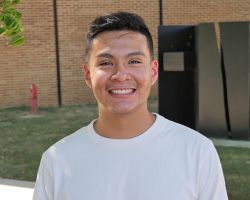Students: Juan Mendoza
Project: Characterizing the Mechanical Properties of Solvent-Cast 3D-Printed Biodegradable Polymer Constructs | View Poster (PDF)
Major: Materials Science and Engineering
Advisor: Lesley Chow
Abstract
The physical properties of biomaterials drive cell-material interactions. For example, it is widely known that substrate stiffness affects stem cell differentiation. Pore size and scaffold architecture also influence cellular behavior because of changes to oxygen and nutrient flow. However, it is difficult to decouple scaffold architecture and mechanical properties, which confounds their impact on cellular responses. Preliminary data from our group with human mesenchymal stromal cells (hMSCs) showed that lower porosity scaffolds promoted osteogenic (bone) responses while higher porosity scaffolds enhanced both chondrogenic (cartilage) and osteogenic activity. We hypothesized that this effect is caused by differences in scaffold stiffness caused by changes in scaffold porosity. The goal of this work was to characterize scaffolds with different porosities. We expect that scaffolds with higher porosities will have a lower scaffold compressive modulus compared to scaffolds with lower porosities. Scaffolds were solvent-cast 3D printed using inks containing polycaprolactone (PCL) dissolved in a volatile solvent and the same nozzle diameter to maintain the same filament diameter. Scaffold architecture was controlled using a custom MATLAB script to generate different filament spacings: 190 μm, 260 μm, and 400 μm. The resulting 3D-printed scaffolds were imaged using scanning electron microscopy (SEM) to visualize scaffold architecture. Scaffold compressive modulus was measured using a custom microindenter in collaboration with the Krick Laboratory at Florida State University). Future work includes fabricating scaffolds with the same stiffness but different porosity by printing with inks containing PCL molecular weight blends.

About Juan Mendoza
Juan Mendoza is an undergraduate senior at Lehigh University majoring in Materials Science and Engineering (MSE). This year marks Juan’s second year as a member of the Chow Lab, which aims to fabricate modular biomaterials to guide functional tissue regeneration. Their group is currently focused on developing biomaterials for osteochondral (bone-cartilage) and corneal tissue applications. Juan’s research interests include characterizing the architecture and mechanical properties of solvent-cast 3D printed scaffolds. His current work focuses on investigating scaffold porosity and its effects on cell response. Outside the lab, Juan enjoys any and all outdoor activities, exercising, and spending time with friends.
